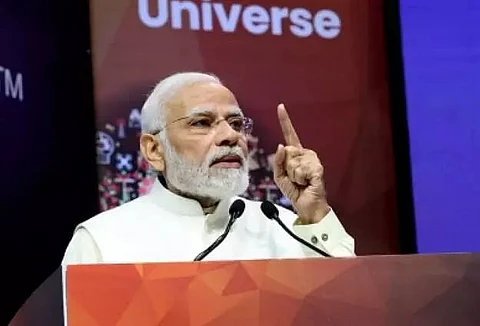
- Home
- Live Blog
- Breaking News
- Top Headlines
- Cities
- NE News
- Sentinel Media
- Sports
- Education
- Jobs

Daniel Goleman, a leading Leadership scholar, once remarked that an ideal leader had basic traits such as intelligence, toughness, determination, and vision. But then, such skills, though necessary, are often insufficient qualities for one to become a highly successful leader. The heartening news for all Indians is that Prime Minister Narendra Modi has emerged as the world's most popular leader. This comes from a survey carried out recently by 'Morning Consult', a US-based consulting firm, with 78% of the respondents voting in his favour. While 22 global leaders were considered for the survey, Modi's ratings have overshadowed those of other leaders, including US President Joe Biden, French President Emmanuel Macron and British Prime Minister Rishi Sunak. Many people often wonder what actually makes a good leader. Many people in various leadership positions too often ask what would take them to the top leadership bracket in their respective fields, be it in politics, government, sports, management, academics or society. According to Peter G Northouse, author of 'Leadership: Theory and Practice" – the world's most popular book on Leadership – as many as 65 different classification systems have been developed in the past six decades to define the dimensions of leadership. Analysing those systems, Northouse has identified four basic components that are central leadership – (i) Leadership is a process, (ii) Leadership involves influence, (iii) Leadership occurs in groups, and (iv) Leadership involves common goals. He said that it is also pertinent to note that while leaders need followers, good leaders need good followers. Northouse has also said that Leadership and Power are interrelated and inseparable and that the concept of power itself is related to leadership because both are part of the influence process. Those interested to know more about successful leadership must note that while power is the capacity or potential to influence, people become powerful and attain upward mobility when they develop the ability to affect the beliefs, attitudes and courses of action of other people. Mao Zedong said that power comes through the barrel of a gun. While that Communist concept has long become obsolete, there are also people who think that power can be bought with money. Many people in our country who are in leadership – irrespective of whether in politics, sports, student bodies, or even literary bodies – think that leadership means money-power. Power is an important component of leadership. But then again, as Northouse has pointed out, there are two major kinds of power – position and personal, both emerging from the individual's capabilities. Picking up from Northouse, one can say that while position power is the power an individual leader derives from having a title in a formal organizational system, personal power comes from followers. One is yet to find scientific research work on the leadership of Narendra Modi. But then, one can possibly conclude that he is the kind of leadership who is different from all his predecessors in the Prime Minister's office.